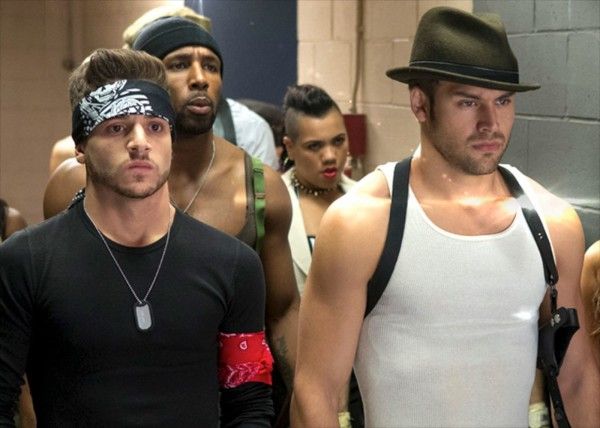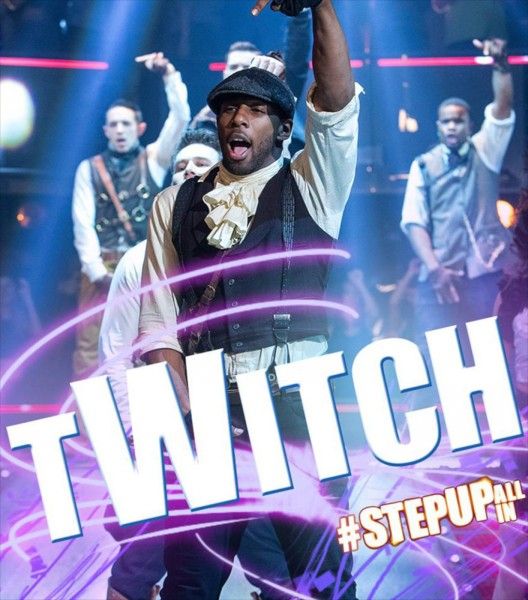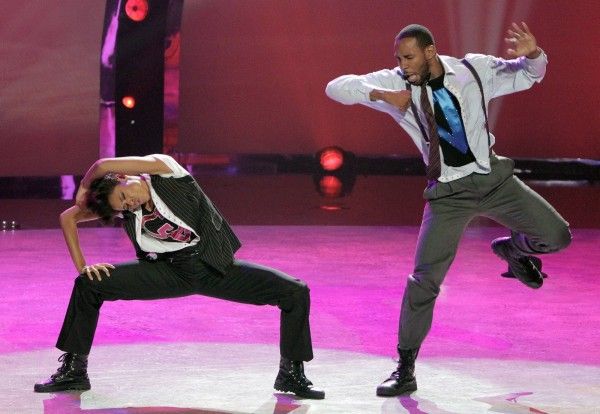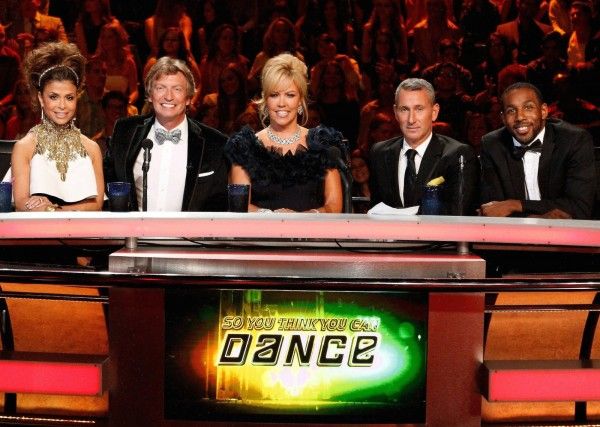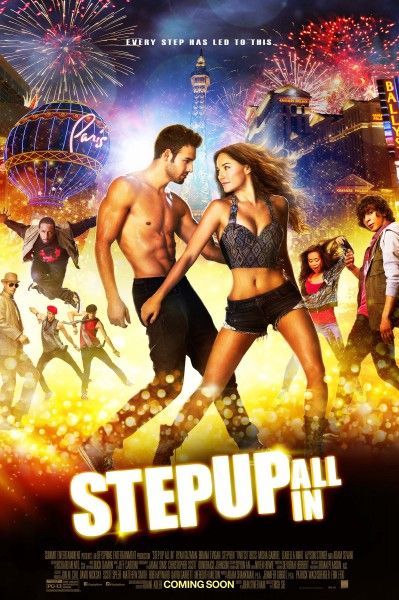Step Up All In takes one of the most popular dance franchises in film history to all new heights, following Miami street dancer Sean Asa (Ryan Guzman) as he tries to make it in Hollywood, only to discover the almost insurmountable odds of making it in the professional dance world. When he meets the headstrong Andie West (Briana Evigan), they form a new dance crew that reaches the final rounds of a high-stakes reality TV competition that will make their dreams come true.
At the film’s press day, dancer-turned-actor Stephen “tWitch” Boss spoke to Collider for this exclusive interview about how amazing it’s been to be a part of the Step Up franchise, that all of the dancing in the films is real with no trickery, the most challenging Step Up dance sequence that he’s had to do, why it’s important to him to incorporate dance with humor and his personality, why he uses dance to communicate, how much So You Think You Can Dance changed his life, dancing on stage vs. dancing in film, and where he’d like his career to go next. Check out our Stephen "tWitch" Boss interview after the jump!
Collider: How cool has it been to be a part of the Step Up franchise, that really allows dancers to also showcase a character and not make it only about the dance moves?
TWITCH: It’s amazing, to be quite honest. Being a fan of dance and a dancer, I love my classic dance movies. The movies that I used to rent every weekend were Breakin’, Breakin’ 2, Beat Street, Flashdance, Grease, and all of that stuff. To me, Step Up is in that vein. At some point in time, in the future, people are going to refer to the Step Up films as the films they grew up on. Hopefully, that inspires them to get in dance films that are being made. We’re creating a legacy, and it’s super exciting to be a part of that, not just as one of the movers, but as an actual character. It’s great.
The dancing in these movies is really awe-inspiring, gravity-defying and almost otherworldly, in a lot of ways, and because of that, people think there must be trickery and special effects involved. Can you attest to the fact that the dancing is all real?
TWITCH: Absolutely! There were no wires involved in any movement. The thing about Step Up is that when it comes to the physically defying movements, if there is a physical element that’s helping us out, you see it because we’re actually utilizing that in the dance. In Revolution, we had a thing where we were attached to bungee chords, running down the wall. We were still doing everything, but we were using those bungee chords. Step Up doesn’t have to hide anything. These are actually moves that people do. It just so happens that dancers are superheroes. People think there is a lot of wire work or camera tricks, but that’s just not the case. When it comes down to it, it’s just not the case. Also, another misconception is that all of the films are the same, and if you’ve seen one Step Up, you’ve seen them all. That’s simply not true either. The finale in this one is the best finale that any Step Up has ever had. The finales in Step Up are always epic, and this one blows them out of the water. It’s ridiculous. Part of the reason for that is that things in the dance world and the art of dance is ever-evolving, just like art does. Dance is an art, so day by day, it’s growing and there are new things that can be done. With the technology that we have now, people are infusing that with dance. That’s what Step Up does. It checks in with what’s going on, what’s relevant and where the dance world is going, and they increase that to the max.
What was the most challenging Step Up dance sequence that you’ve shot?
TWITCH: I think the most challenging one was the finale for Step Up: Revolution, which was set in Miami in the summertime, and that’s where we shot, outside in the summertime. It was super hot and there was no shade. It was hot, and we were dancing and sweating, and it got real dark. It was hot outside. That was the most challenging sequence, from the heat alone. Then, we were also dancing really hard.
Some of the past films have had more of a sense of danger to them, but this film has more of a sense of fun and humor to it. Has it always been important to you to incorporate dance with humor and your personality?
TWITCH: Absolutely! It’s been part of my signature to incorporate my humor with my dance, or even just how I’m feeling. If I’m feeling humorous, which I am, most of the day, I tend to incorporate that. If I’m dancing freestyle, if I feel like I’ve gotten too serious, while I’m moving, I’ll think, “All right, it’s time to lighten up a little bit,” and I do. It just feels good. This is just really refreshing because the tone of the movie is not so serious. Even though the plotline is pretty realistic, with the struggles of being a professional dancer, and the opening sequence alone is an audition montage, if you are a professional dancer or an aspiring anything, you get where we’re going with that. Sometimes you just walk into situations and you’re like, “What is going on here?! What do you want from me? What am I doing here?” It captured that within that montage.
No matter what your personality off the dance floor is, once you step onto the dance floor, ego goes out the window and it’s all about the dance. Why do you think that is?
TWITCH: It depends on how people relate with others, to be quite honest. As dancers, especially for myself, personally, dance constitutes a lot of the conversation that I have. While I’m not a ridiculous wordsmith and I can’t clearly verbalize the things that I’m feeling sometimes, I’d say that I can emote how I feel by dancing, 100% of the time, and fearlessly at that. When it comes to that, it is all about the dance. It removes you from this construct of the world that you have, and it’s a conversation that you’re having with people. That’s how dance grew, as an art form. People can stand around and share movement with each other, whether it’s professional or not. That’s how it grows. That’s what dance does. It’s its own language.
So You Think You Can Dance changed your life, in the sense that it gave you a dance career, a visibility, a family and a wife. What’s it been like to be a part of that?
TWITCH: It was life-changing. In my particular case, had I not made the show in Season 4, I would have gone into the Navy. Literally everything that’s happening right now is a blessing and a gift. It’s surreal. Every life choice and everything that I’ve done, from then on out, happened at that crossroads. When I made it onto the show, everything changed. It’s great. I’m a family man now. I met my wife on the show. She was also a contestant, and is now an all-star and choreographer on the show. It’s been great. So You Think You Can Dance is a home for me.
Is it a head trip to go from being someone auditioning for the show and putting your life in the judges hands, to then turn the tables and be a judge yourself, and decide whether other people get to live their dance dreams?
TWITCH: Yeah, it is a bit of a head trip, and oftentimes, a head trip that I was not quite ready for. When I got the call that said, “Would you like to come judge?,” I was like, “Did you call the right person? You know this is Twitch, right? You want me to come judge?” It’s nerve-wracking. A lot of the time, when you watch the episodes, I’m up there with them. I don’t have a poker face when they’re dancing. If I like it, I love it and I’m dancing with them and smiling from ear to ear. There’s a lot that’s emotionally invested. It’s not the end all, be all, but I know how much life can change from what you do up there, on that stage. It’s definitely a bit of a head trip, but it’s also super awesome, for it to come full-circle like that.
How difficult is it to go from dancing on stage to dancing in film?
TWITCH: The energy was difficult to adjust, but my thing was my face. I’m really expressive, but on film, the camera picks up everything. From the stage, you can be as expressive as you’d like to be ‘cause you want the person way in the back to know that you’re into it. But on film, you just look crazy. Those minor adjustments make major changes in your performance.
Where do you want to go from here, with your career?
TWITCH: As far as the performance aspect, I’m going to be an actor. I still love performing, but I’m moving into more acting. I’ve been taking classes. I’ve done a couple guest star roles. I’m really looking forward to that journey, which is great. And then, with dance, it’s about education. I’m teaching a lot. I teach the foundations of hip-hop. Also, I’m working my way into fitness, as well. I’m a Gatorade athlete because dance is being recognized as a sport now. It always should have been, but now it is. It’s very exciting.
Step Up All In is now playing in theaters.


